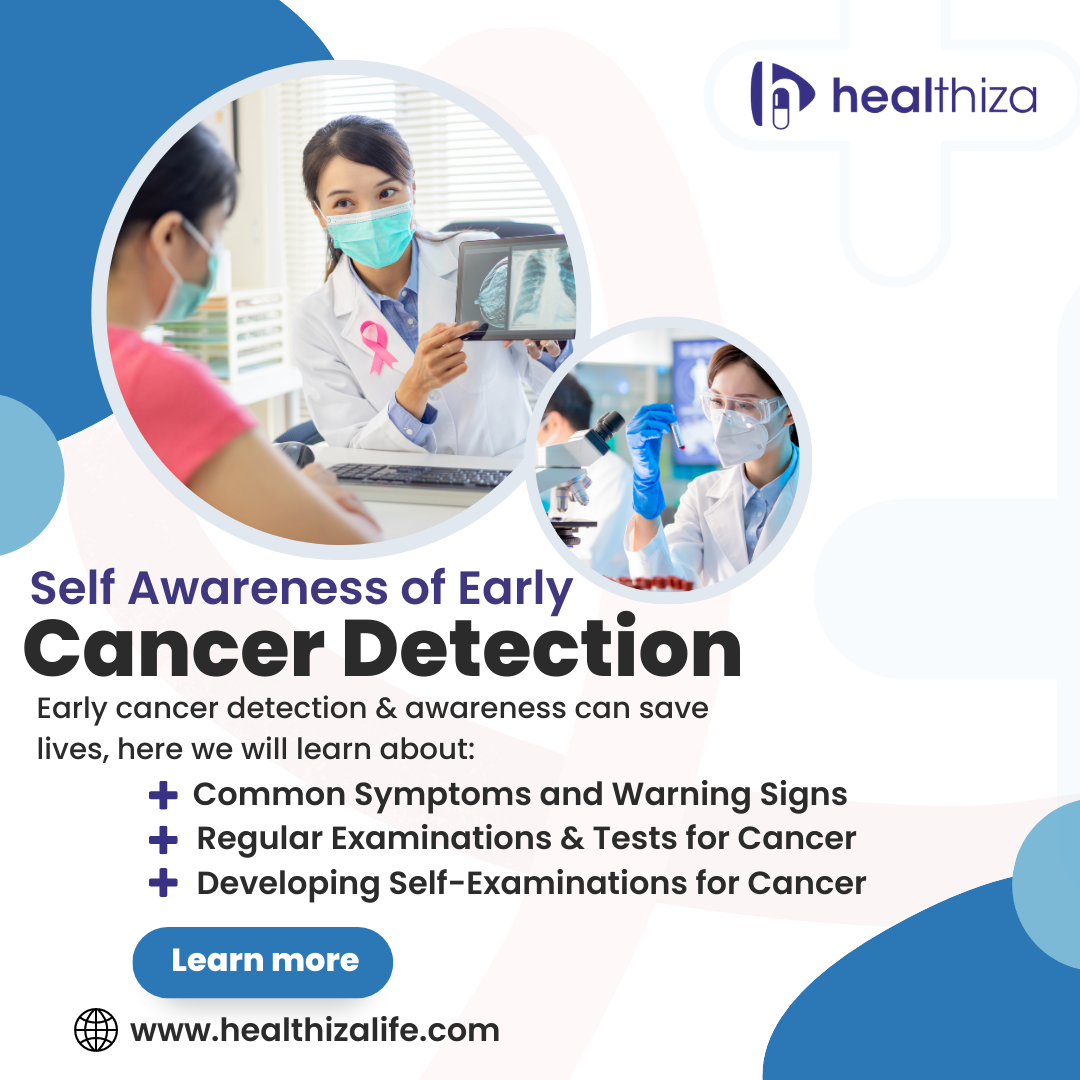How Early Cancer Detection is Useful?
Early cancer detection is essential for boosting survival rates and optimizing treatment results. Millions of people worldwide are impacted by the complex disease known as cancer. Let’s talk about the significance of cancer awareness and offer useful advice on how to spot early warning signs and symptoms.
Common Symptoms and Warning Signs
Although there are many different types of cancer, it is important to be familiar with some common warning signs.
Breast Cancer
Breast lumps or thickening, nipple discharge or inversion, changes to the breast’s size or form, and skin alterations (dimpling, redness, or puckering)
Lung Cancer
Respiratory infections that reoccur frequently, persistent cough, chest pain, breathe shortness, coughing up blood, and hoarseness
Colorectal Cancer
Constipation or diarrhea, blood in the stool, cramping or pain in the stomach, and unexplained weight loss are all signs of bowel changes.
Prostate Cancer
Frequent urination, poor urine flow, and pelvic pain or discomfort
Melanoma
Sores that don’t heal, irritation or pain, unusual skin growth, or changes in patches
Cervical Cancer
Increased vaginal discharge, post-coital bleed, abnormal vaginal bleeding, and pelvic pain or discomfort
Ovarian Cancer
Changes in bowel movements, pelvic pain, regular urination, feeling stuffed rapidly, and bloating in the abdomen or swelling
Pancreatic Cancer
Abdominal discomfort or soreness, unexplainable weight loss, jaundice (a condition that causes the skin and eyes to turn yellow), appetite loss, and digestive issues
Liver Cancer
Abdominal discomfort or swelling, unexpected weight loss, biliary symptoms, exhaustion, appetite loss, nausea, or vomiting
Stomach Cancer
Abdominal ache or discomfort, heartburn, indigestion, nausea, bloating, undiagnosed weight loss, or trouble swallowing
Bladder Cancer
Urinary urgency or incontinence, frequent urination, discomfort or burning during urinating, pelvic pain
It is always preferable to visit a medical professional for examination and the proper tests because these symptoms could potentially be brought on by other ailments.
Regular Examinations and Tests for Cancer Detection
Screenings are good early cancer detection methods since they can spot cancer even before symptoms appear.
- Cancer Type- Cervical Cancer
- Diagnostic Test- Pap Smear Test
- Targeted Population- Women who are 21 or older (other recommendations may apply)
- Cancer Type– Breast Cancer
- Diagnostic Test- Mammogram
- Targeted Population- Women over the age of 40 (recommendations may differ)
- Cancer Type- Colorectal Cancer
- Diagnostic Test- Colonoscopy
- Targeted Population- Adults 45 to 75 (younger for those at higher risk)
- Cancer Type- Prostate Cancer
- Diagnostic Test- PSA (Prostate Specific Antigen) Test
- Targeted Population- Men over the age of 50 (high-risk persons sooner)
- Cancer Type- Lung Cancer
- Diagnostic Test- LDCT (Low-Dose Computed Tomography) Scan
- Targeted Population- Adults 55 to 80 years old who have smoked heavily in the past
- Cancer Type- Skin Cancer
- Diagnostic Test- Biopsy and Examination of Skin
- Targeted Population- People with high-risk conditions or worrisome skin lesions
- Cancer Type- Ovarian Cancer
- Diagnostic Test- Transvaginal Ultrasound Test
- Targeted Population- Women with a history of disease or other risk factors
- Cancer Type- Pancreatic Cancer
- Diagnostic Test- Un specific Routine Test
- Targeted Population- High-risk people might have genetic testing.
- Cancer Type- Liver Cancer
- Diagnostic Test- Un specific Routine Test
- Targeted Population- Those who are at high risk might have imaging tests.
- Cancer Type- Stomach Cancer
- Diagnostic Test- Un specific Routine Test
- Targeted Population- People who are at high risk might get an endoscopy.
- Cancer Type- Bladder Cancer
- Diagnostic Test- Urine Cytology, Cystoscopy
- Targeted Population- Those who exhibit symptoms or who have high-risk characteristics
These examinations can find unnatural modifications to the body. It’s important to regularly participate in advised screenings, especially for those who have a history of cancer in their families or other high-risk factors.
Developing Self-Examinations for Cancer Detection
Self-examinations are crucial for cancer detection in addition to screenings.
The following main considerations underline the significance of self-examination in the early identification of cancer:
Self-Examination of the Breast:
Self-examination of the breasts assists people in acquire accustomed to the natural appearance and sensation of their breasts.
Individuals can find any new lumps, variations in size or shape, skin anomalies, discharge from the nipple, or other unexpected breast changes by completing monthly breast self-exams.
Self-examination can aid in early identification of breast cancer and prompt medical intervention can improve treatment outcomes and boost survival rates.
Self-Examination of the Skin:
Regular skin self-examinations aid in the early detection of skin malignancies like melanoma. People can look for any new moles, changes in existing moles, and other skin abnormalities by thoroughly inspecting their entire body from head to toe.
Self-Examination of the Testicles:
Examining one’s testicles for lumps, swells, or other anomalies is known as testicular self-examination.
People can detect any changes in the testicles’ size, shape, or consistency that could indicate testicular cancer by undergoing monthly testicular self-examinations.
Self-examination can help identify testicular cancer early and prompt medical intervention, perhaps increasing treatment results and preserving fertility.
Oral Self-Examination:
When performing an oral self-examination, you should look inside of your mouth, gums, tongue, and throat for any abnormal growths, sores, or modifications to color or texture.
Self-examinations of the mouth on a regular basis can help identify early indications of oral cancer, enabling people to seek oral or medical care for a more thorough examination.
We promote early detection and preventive healthcare by educating people on how to undertake this easy-to-do yet very efficient self-examinations.
Conclusion
We can help people implement proactive measures in controlling their health by educating them about the warning signals, underlining the value of regular checkups, and arming them with information regarding self-examinations. Make your health a priority by taking the first step. We strongly advise you to speak with your healthcare professional or a specialist if you have any questions or need direction.


